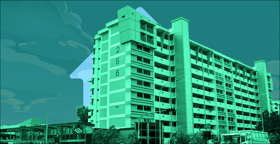Thinking of getting a flat purely for investment purposes? We delve into each type - BTO, resale and ECs - to see which of these would give you the highest profit margin.
We’ve all heard our friends complain about the long Build-To-Order (BTO) completion periods and how it has forced many of them to apply for a BTO flat earlier than ever. Or perhaps you are one of those who have had to alter your plans to accommodate the long wait time.
While some are turning to BTOs to create a forever home with their partners, others are purchasing them as an investment vehicle instead. According to TODAY, the proportion of BTO flats sold just after the five-year Minimum Occupancy Period (MOP) have doubled from 2016 to 2020.
If you’re a part of this shocking statistic or are planning to dive into property investing, here’s a breakdown of whether you’ve chosen (or are going to choose) the right property type for investing. In this article, we will compare among BTO flats, resale flats, and Executive Condominiums (ECs).
Table of contents
Why should I invest in property?
Property investing is getting increasingly popular among investors, and here’s why:
#1 Passive income
Investing in a property gives you a steady stream of passive income if you decide to rent a room or the entire house out. Think of it as monthly dividends when you invest in stocks, just that these dividends are guaranteed every month, as long as you have someone who’s renting your space.
Regardless of whether you’re rich enough to afford another property altogether just for rental, or whether you’re planning on renting out a spare room of your own home, it gives you additional income to supplement your monthly salary.
This rental income can be used to offset your monthly mortgage payments or go towards the maintenance costs. If your returns are high enough, you can even earn positive cash flow from your property.
#2 Appreciation value
Unlike other investment products, the value of properties tends to appreciate over time. Especially if your property is located in a good central location, you can expect to profit from it when you sell it.
As the economy grows, the demand for residential and commercial spaces increases, making real estate more attractive and lucrative. Experts from global bank Morgan Stanley also predict that property prices in Singapore will double by 2030, so see if you can hold out till then.
#3 Cheaper leverage
Investing in real estate also gives you access to cheaper leverage than investing in the stock market. When you take up a bank loan or HDB loan, you can borrow a large sum of money at a low interest rate, normally pegged 0.1% above the interest rate for CPF Ordinary Account (OA) for bank loans, or between 1.3% to 3% p.a. for bank loans.
This is much cheaper than the leverage that you can opt for when investing in stocks. You’ll normally have to pay exorbitant fees that can go up to hundreds when you close the trade, and the longer you hold the trade the more you’ll have to pay.
When the price of the property increases, your returns on the money that you invested are multiplied. But likewise, your losses are multiplied when the price of the property decreases.
#4 Less volatile market
The property market is not as volatile as the stock market, and that is because the value of property seldom changes as quickly as the value of stocks.
The price of your property will not likely increase twofold in the next five years, unlike stocks that have a high likelihood of it happening. On the other hand, the value of the property will also seldom plunge significantly. Property prices generally appreciate over time.
#5 Flexibility of space
Unlike other assets like stocks that don’t grant you any practical purpose aside from monetary value, investing in a house gives you the flexibility of using the space however you want.
You can rent out a room for someone else to call home, turn the space into an office for your WFH arrangements, or rent out as a commercial space for events.
#6 Property market easier to understand
If you’re a newbie to real estate investing, the barriers to entry (in particular, market knowledge) are pretty low. Investing in property is generally quite simple and straightforward, and the information that you’ll need is easily accessible online.
For example, you can check competitor listings, past transaction histories and rental yields on the web, and information is also well-regulated by Urban Redevelopment Authority (URA). Furthermore, Singapore is small so it is easier to be well-acquainted with crucial information like which locations will bring you higher yield or the amenities available in close proximity.
On the contrary, investing in stocks requires more in-depth market research and knowledge to get you started. You will need to have a good grasp of investment basics and be well-versed in technical terms and financial forecasts to read and predict the market correctly.
However, if you’re thrown off by the high barriers to entry because of the purchase price, you can always start off small by delving into the stock market through robo-advisors or on your own through a brokerage account.
Is a BTO flat a good investment?
A BTO flat is probably the most affordable housing you can get in Singapore because it is always sold at a subsidised price to fellow homeowners. BTO flats in non-mature estates are even more appealing because of their cheaper prices. Coupled with future developments in the area, BTO flats will appreciate in price and their value will always be higher than the cost price once the five-year Minimum Occupancy Period (MOP) is over.
For this reason, many flock to BTOs high-profit margin. You can either sell it after the five-year MOP or choose to keep the home for rental income, though purchasing another property will incur an Additional Buyer’s Stamp Duty (ABSD).
A four-room BTO flat in Boon Keng that was recently launched in August 2021 is priced from S$413,000 to S$507,000. Compare that to a resale flat in the same area on Property Guru, which ranges from S$420,000 all the way up to S$635,000.
The downside of investing in a BTO flat is that it takes a long time to be completed and it is extremely competitive so your chances of a successful ballot - especially for a highly sought-after development - is low. There has also recently been an oversupply of flats in new estates like Punggol, which makes it more difficult to sell the flat and fetch a good price.
| Pros of investing in a BTO flat | Cons of investing in a BTO flat |
| High potential appreciation: BTO flats are brand new and sold at a subsidised price so the potential appreciation is high | Long waiting time: BTO flats typically take about two to five years to complete |
| Cheaper to renovate: Renovation costs will be less than that of resale flats since BTOs are brand new and require less work | Limited choice of location: Limited location choices that depend on the launches, with only four launches per year |
| More modern unit layouts: Layouts of BTO flats are more modern than resale flats and thus more appealing | Low chances of successful balloting: BTO flat application is extremely competitive and chances of getting popular projects are low |
| Most affordable: Cheapest option that requires low capital | Smaller room size compared to older flats: BTO flats are generally smaller than older flats |
| Fewer grants available compared to resale: BTO flats have fewer grants that can be used to offset the purchase price |
Is a resale flat a good investment?
If you’re expecting a huge windfall after completing the sale of your flat, you might want to look elsewhere other than a resale flat. Out of the three types of housing, a resale flat is probably the least profitable due to the high purchase price. Not forgetting the exorbitant Cash Over Valuation (COV) in recent years, resale flats have the lowest potential appreciation.
For those who have spent a bomb on renovation, it will be even more difficult to fetch a good price to cover your renovation cost and purchase price, since your offer will be high. There is also a possibility that it could depreciate due to lease decay, when the 99-year lease starts to run out.
These high prices are usually justified by the immediate availability of resale flats, compared to the long waiting time for BTOs and ECs to be completed. On top of that, you also get a say in the exact location of your desired property - be it in close proximity to an MRT station or within the central area where demand is high.
Not all hope is lost, though. A flat in a good location, or where future upside developments will take place, is key to securing a buyer with a good offer. You’ll also be able to appeal to the Permanent Residents in Singapore, since they are only allowed to buy resale flats for public housing.
On top of that, many may choose a resale flat for rental to earn passive income, since you won’t have to wait out the MOP, unlike with BTO flats and ECs. However, you cannot own two HDB flats at a time.
| Pros of investing in a resale flat | Cons of investing in a resale flat |
| Flexibility of location: Wide selection of locations available due to a large number of resale flats online | Not a fresh 99-year lease: Buying a resale would mean that the flat would have less than 99 years remaining on the lease |
| More grants available: Additional grants for resale flats that can offset the purchase price | More expensive: Resale flats are more expensive than BTO flats and have high COV |
| Larger than BTO flats: Older flats are likely to be larger than BTO flats | Higher renovation costs: Renovation costs are higher since resale flats are not brand new and may require more work |
| No waiting time: Resale flats are completed and are move-in ready | Low appreciation potential: Profit margin is the lowest for resale flats because of the high purchase price |
| Maintenance issues: Resale flats are older and could mean more maintenance issues than newer flats or BTO flats |
Is an EC a good investment?
Aside from the long completion time and incredibly limited location options, ECs are highly sought after because they become privatised after 10 years. This makes for a high appreciation potential since the market value will increase exponentially once it converts into a private condominium.
To put things into perspective, Parc Centros was an EC that was launched in 2012 in Punggol. The initial purchase price was at an average of S$950 per square foot, and now it has increased to an average of S$1,300 per square foot on PropertyGuru after nine years, and can still be expected to increase once it becomes a private condo.
Not everyone can afford to invest in an EC since they are very expensive, but if you do manage to get hold of one, you can expect to earn a healthy profit upon MOP, especially if there are upcoming developments in the area that will further propel the prices upwards.
| Pros of investing in an EC | Cons of investing in an EC |
| Nearly guaranteed appreciation potential: Large profit margin when it becomes privatised | Expensive: Not many can afford an EC and there is also a 25% downpayment since you can only take up a bank loan |
| Cheaper than private condo: Lower purchase price than private condo counterpart since it is considered public housing | Limited locations: Locations are extremely limited and usually quite inaccessible |
| Units are bigger than private condo: Units in ECs tend to be larger | Long waiting time: ECs also have a long waiting time for completion |
| Access to facilities: ECs also give you excess to the standard condo facilities | Cannot own an HDB: Buyers have to sell their existing HDB flat before they can get an EC |
Which is best for investment?
A BTO flat or an EC offers the highest potential for appreciation and a higher margin cost.
BTO flats have lower barriers to entry because they are cheaper, and offer a wider selection of locations than ECs (although still a lot more limited compared to resale flats). The downside of BTOs is that you’ll have to wait about two to five years before your flat is completed, and can only rent it out when the MOP is over.
On the other hand, ECs are a lot more expensive but can fetch you a good price once they become privatised into a condo. You’ll also get to enjoy the prestige that comes with the hefty price tag, and access to the range of facilities that a normal private condo would offer. However, they also have a long completion time and a five-year MOP before you can rent it out, coupled with the extra five years before it is privatised.
On the other hand, a resale flat provides an immediate rental income as it is the only option that does not have any MOP. You can rent a room or the entire unit out immediately, which will give you a steady flow of income as long as you have a tenant living in your space.
All in all, it depends on your financial situation and your intention of investing in real estate. Once you figure out your financial goals, you can make an informed decision on deciding which type of housing would suit your needs and circumstances the best.
Read these next:
Guide To Property Investment In Singapore
A Complete Guide To Real Estate Investment Trusts (REITs)
HDB BTO, SBF Or Resale: Which Should You Pick?
How Much Do You Need To Buy Your First Home In Singapore?
Best Home Loans in Singapore 2021
Similar articles
What Happens If: My Partner And I Exceed The HDB BTO Income Ceiling?
2023 Guide To Executive Condominiums (EC) In Singapore
BTO versus Resale Flat: How Much Will Renovations Cost?
Why a BTO Flat Makes More Sense Than an EC (Even If You Can Afford It)
Rising Trend of Co-Living Among Millennials in Singapore: Survey
Liquor Lovers, Here Are 3 Ways You Can Invest In Rare Whisky
Who Should Buy an Executive Condominium?
5 Reasons Why Executive Condominiums Could Make A Better Investment Despite Rising Inflation










